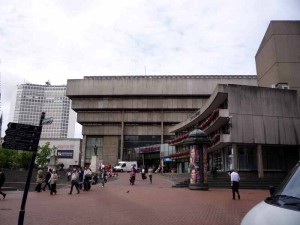By Alan Clawley.
The current concerns as to whether Culture Minister Jeremy Hunt was influenced by those with a financial interest in the outcome of his decision on BSkyB reminds me of the arguments used by Friends of the Central Library to challenge the decision that Hunt made not to list the Central Library.
We argued, unsuccessfully as it turned out, that it was perverse to have rejected the advice of acknowledged experts and in particular those of his statutory advisor, English Heritage. We thought that our arguments were compelling, but judge for yourself.
Expert witnesses are professionals who have studied, practised, written and broadcast extensively on the subject of architecture and who have a wide and detached knowledge to enable them to compare and objectively evaluate ‘architectural or historic interest’. Expert witnesses in the context of listed buildings comprise architects, architectural historians, architectural writers, and broadcasters, and architectural conservationists, the sort of expertise available in English Heritage who are precisely positioned to offer the minister the most relevant and reliable advice.
However, when such an expert is hired by the building owner – as was architect Anthony Blee in this case to prepare a case against listing – the result may not be entirely objective and therefore should be treated with caution by the Minister.
The Minister should have made allowance for the likelihood that architectural practices that oppose the council’s application may abstain from publicly expressing their support for listing rather than risk losing work from the Council. In this case the level of support for listing from local architectural firms in particular will tend to be under-represented.
The Commission for Architecture and the Built Environment (CABE) contains architectural expertise on new buildings and the built environment but it did not have the historical remit with which English Heritage was charged and is therefore less directly relevant to the listing process. Its board was dominated by practising architects rather than conservation architects or architectural historians. The government decided in 2010 that it would no longer fund CABE and would, in future, rely solely on English Heritage for official advice on listing.
Lay witnesses may have a good knowledge of the building and may know of similar buildings from their own experience, but the views they express are purely personal and largely anecdotal. The philosopher Alain de Botton, in The Architecture of Happiness (2006), writes as a lay person in this context: ‘We may decide that we hate nineteenth century gothic, for instance, because it characterised a house in which we were unhappy at university, or revile Neoclassicism because it had the misfortune to be favoured by the Nazis.’
The collection of Pen Portraits published in the Birmingham Post is an example of lay witness evidence. Lay people are not obliged to explain or justify their opinions to anyone nor to articulate what hidden factors have influenced their opinion, such as a financial interest in the building’s future or other reason not relevant to its architectural or historical interest. Lay witnesses cannot therefore be relied upon to confine their views to matters purely relevant to listing process.
Organisations composed mainly of lay people, such as the Civic Society may include support for or opposition to the listing of a building amongst its other objectives or present evidence of historical interest whilst not being able to claim expertise in architectural design. They may also support the Council’s application regardless of their view about the architectural merit of the Library for many varied reasons. They may depend on public funding, like to support the Council, or anticipate applying for planning permission for a building of their own in the near future.
Civil servants employed by the Department of Culture Media and Sport are, in this instance, laypersons, whose job is to advise the Minister on Listing and who are not required to have architectural qualifications or experience. Instead they are expected to demonstrate the ability to summarise ‘accurately and fairly’ the views of others, including those who are experts in architecture such as English Heritage and interested architects.
There was of course never any direct evidence emanating from the Department of Culture Media and Sport to prove that Hunt’s decision not to list the Library was made purely on grounds of architectural and historic interest as the law demands. All we can do is draw our own conclusions from the outcome.
See also Richard Lutz’s article, Jeremy Hunt: Still Under a Murdoch Cloud



